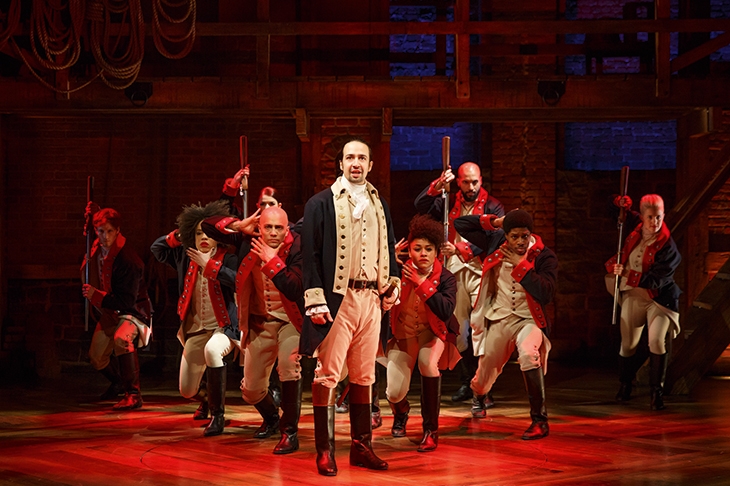Americans may be able to draw on only 250 years of history, but they’re not shy of making a song and dance of it. In early December, Hamilton, Lin-Manuel Miranda’s $1 billion-grossing, hip-hop and show-tune extravaganza about one of the country’s founding fathers will finally open to sold-out crowds in London. It joins the Menier Chocolate Factory’s sold-out revival of Sondheim’s Assassins, the Tony Award-winning musical about the cranks and misfits who have, to paraphrase its opening number, exercised their right to follow their dreams by attempting to assassinate US presidents from Roosevelt to Reagan (but not, yet, Trump).
Both shows fit neatly into the American tradition of making successful musicals out of American history, especially during periods of national introspection and cultural turmoil. In 1969, the year of Woodstock and anti-Vietnam marches, the Broadway smash hit was 1776. It was conceived by a high-school history teacher and its co-writer described it as ‘maybe the worst idea that had ever been proposed for a musical’. Regardless, its depiction of Benjamin Franklin singing about the Declaration of Independence won three Tony Awards.
More recently garlanded shows from the Great American History Book include: The Civil War (nominated for a Tony, despite being dismissed by the New York Times as being without plot or character); Miss Saigon (Madama Butterfly, in Vietnam, with prostitutes, by the writers of Les Misérables); and The Scottsboro Boys, a moving depiction of racism and injustice in 1930s Alabama by Kander and Ebb, the writers of Chicago and Cabaret.
Consider, on the other hand, Britain’s most successful writing duo. The Likes of Us, Lloyd Webber and Rice’s little-known first musical, written in 1965, was based on Dr Barnardo’s concern for destitute children in Victorian London. After failing to secure funding, the future knight and future-former peer wisely decided to plunder Argentina’s history instead. And the Bible’s.
So where is the British Hamilton when we need one? Might it not help soothe our current Kulturkampf? And why has there never been a hit musical about any British historical event in the past 1,000 years?
Perhaps the main problem is that the British nation doesn’t have a very good founding myth. As Robert Tombs points out in The English and Their History, historians cannot even agree on whether to subsume English history within a wider narrative of the British Isles. The Romans had Romulus and Remus. The Americans have their revolutionary war, in which they neatly airbrush the fact that a third of Americans were neutral and a further third fought for the British. Even the French get Les Misérables.
The British, meanwhile, have a convoluted narrative which ranges from the Battle of Hastings to the Battle of Britain, Magna Carta to the Glorious Revolution, the Acts of Union to the European Union (Notice of Withdrawal) Act 2017. And while Brexit the Musical did a roaring trade on the Edinburgh Fringe this year, sadly it cannot yet be described as a historical musical. Neither is it easy to imagine its farcical elements (Boris in Union Jack boxer shorts; Cameron with a blow-up piglet; George Osborne wielding actual power) transferring well to a bigger stage.
Some of our history lends itself to the popular dramatic themes of liberty from tyranny, triumph in adversity, but much of it is too complicated, too embarrassing or too controversial for glib storytelling. Anyone for Mau Mau: The Musical! — a toe-tapping exploration of imperial conquest and decline?
But it didn’t stop Julian Fellowes borrowing liberally from the history books (or perhaps just from Wikipedia) in another medium, did it? Or, indeed, more subtle writers and auteurs, from Hilary Mantel to Robert Harris, Peter Morgan to Mel Gibson. As William Faulkner wrote, ‘The past is never dead. It’s not even past.’ British history is big business, in everything from Sunday night television to tourism, fiction to film, genealogy to toppling statues of Nelson — everywhere, it seems, apart from the West End, which continues to prefer safe jukebox musicals.
And while some British history may not translate easily to the medium of musicals, it is hardly comparable to Germany’s, to which only The Producers and Springtime for Hitler could do justice. Consider the epic story of love, power and betrayal that is the relationship between Henry II and Thomas à Becket. Or the ‘girl power’ displayed by both Elizabeth I and Mary Queen of Scots. Or the suffragettes. Surely there must be something in Michael Gove’s approved syllabus of our island story that would lend itself to a chorus line and a disapproving review in the Guardian?
I’m not saying it’s easy. Last month, these pages carried an entertaining book review of Must Close Saturday: The Decline and Fall of the British Musical Flop. Notable among the stinkers was Winnie, in which the greatest Briton of all time had to rhyme ‘factotum’ with ‘grab Hitler by the scrotum’. Similarly, of all the indignities suffered by Henry VIII’s six wives, few can compare with the King’s rhyming of ‘wooed her’ with ‘poo-pooed her’.
This month I’ll be hoping that a historical musical I’ve co-authored and produced will not be joining this ignominious list. Called The End of History, and running at the Tristan Bates Theatre in the West End, it is about a group of disruptive teenagers attempting to get to grips with the events of the short 20th century, from the Treaty of Versailles to the fall of the Berlin Wall, via Munich, Cuba, Saigon and Prague.
If it doesn’t close on the first Saturday (it is, incidentally, not sold out yet), I shall certainly be looking nearer to home for a patriotic follow-up. Or perhaps someone else will grasp the mantle. Imagine the fun, in this new era of cultural nationalism, of seeing a British musical about the Napoleonic wars called 1812, culminating in a flaming White House, open to sold-out crowds in its Broadway transfer.
Iain Hollingshead and Eleanor Shaw discuss historical musicals on The Spectator Podcast.






Comments